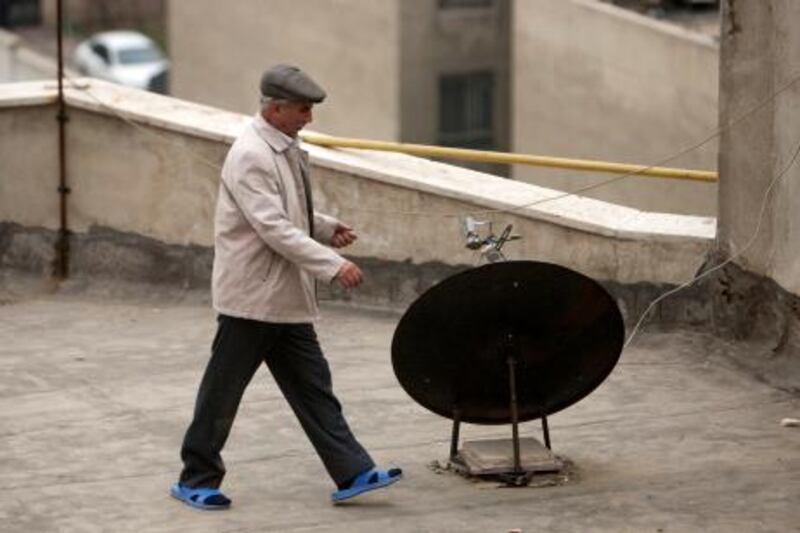LONDON // Four Iranians gather for a cozy dinner party, cracking jokes in Persian over a traditional meal of saffron rice and stew.
It is a tableau that could be straight out of Tehran. But instead it is a scene from a reality television show shot in Europe and broadcast by satellite from studios in south-west London.
With light fare such as Befarmaeed Sham, (Welcome to Dinner), the Iranian answer to the UK cooking show Come Dine With Me, family-owned channel Manoto 1 has struck a chord inside Iran, gaining what is likely to be millions of fans since launching in 2010. In the process, it has also irked Iran's Islamic government.
"Manoto is closer to us than other channels culturally, and their shows are more fun," said Mohamad, 25, of Esfahan. "It's like we are watching ourselves on television. Even their presenters are people who seem similar to us."
Satellite dishes are illegal in Iran, and the government periodically cracks down on owners and scrambles content from western channels. Still, the dishes are sold and installed widely on the black market.
About 40 per cent of Iranians watch satellite programmes broadcast from outside the country, according to a 2010 estimate from BBC Monitoring.
While the channel is a hit with viewers, Manoto has angered authorities - who view it as part of a cultural "soft war" waged by the West. The Iranian government sometimes jams Manoto's signal, according to viewers.
"Manoto broadcasts programmes that are completely against Islamic edicts, such as promoting the way the rich live," said the researcher Mohammad Reza Khoshroo at a conference held in Iran this year, according to comments reported by Iran's Hawzah News Agency.
Kayvan and Marjan Abbassi, the UK-based Iranian couple who launched Manoto's parent company, Marjan TV, in 2009, stay out of the media spotlight. They and other Marjan TV officials declined to comment for this story despite repeated requests for interviews.
Manoto is partly funded by corporate sponsorships and has been sponsored in the past by companies that sell consumer products inside Iran, including Samsung and LG, according to Marjan TV's website.
Manoto's funding also comes from venture capitalists, according to a 2011 report on human rights and information access in Iran by the Foreign Policy Centre, a UK-based independent think tank. The report did not name the firms behind the station.
The Abbassis's previous venture, Bebin.tv, an online channel aimed at second-generation Iranians living in the West, shut in 2008. Manoto continues Bebin's focus on youth culture on a more ambitious scale, with several original shows, a second channel that airs documentaries and licences to broadcast Miss World, the Golden Globes and the Grammy Awards.
Media professionals and Iran watchers said it was not known what role politics played in the Abbassis's business strategy, if any.
What was clear was that the channel has tapped into a yearning in Iran for creative, original Persian-language programming, they said. Though satellite channels can be accessed worldwide, experts believe the vast majority of the viewership for Persian-language channels is inside Iran.
Manoto's popular news satire show, hosted by a cartoon monkey named Dr Copy, is aimed at viewers who do not follow politics closely. Dr Copy makes barbs at both Iranian and western politicians, uses a laugh track and often receives feedback and photos from child fans.
"This is television for the masses," said Mahmood Enayat, who directs the Iran Media Program at the Annenberg School for Communication at the University of Pennsylvania. "It's not for the elite or upper class."
One proof of Manoto's success is that it appears to be a favourite target for Iran's censors, who must be selective about the programmes and channels they choose to jam because it is difficult to do so, media experts said.
Manoto isn't alone among its competitors in being targeted by Iran's censors, Mr Enayat said. VOA, BBC Persian and Farsi 1 face the same issue, he said.
"If you don't get jammed that means you are safe television and the government doesn't feel threatened by you."





